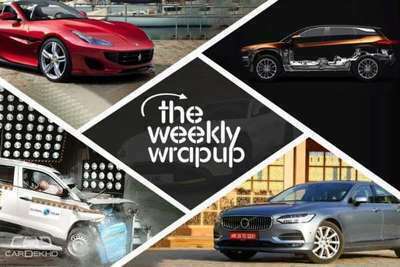Nutson's Auto News Weekly Wrap-up Week Ending July 22, 2023
 |
 |
LEARN MORE: Complete versions of today's news nuggets, along with thousands of pages of relevant news and opinions, information stored in a million-page library published and indexed on The Auto Channel during the past 25 years. Complete information can be found by copying a headline and inserting it into any Site Search Box.
Here are Larry's picks among the past week's important, relevant, semi-secret, or snappy automotive news, opinions and insider back stories presented as expertly crafted easy-to-understand automotive universe news nuggets.Nutson's Auto News Weekly Wrap-up July 16-22, 2023.
* A fuel Choice bill has been introduced in the Republican controlled House of Representatives that would bar the EPAfrom finalizing strong new emissions standards that would push the auto industry toward electric vehicles. The legislation is dubbed the Choice in Automobile Retail Sales (CARS). It would amend the Clean Air Act to say that regulations cannot mandate the use of specific technology or result in the limited availability of new vehicles with any particular powertrain type. The EPA's proposed rule would rquire a 56% reduction in emissions for model years 2027 to 2032. EPA estimates this would push automakers to sell more than two-thirds electric vehicles by 2032.
* Meanwhile! Nearly 100 members of Congress in a letter urged the Environmental Protection Agency to implement "the strongest feasible" emissions standards. The letter, signed by 12 Democratic senators and more than 80 House members, contrasts with opposition to the standards from Republicans in Congress and major automakers. The lawmakers urged the EPA to implement even stricter regulations, citing expert warnings that the Earth is on a path to exceed the 1.5 degree Celsius temperature increase above pre-industrial levels, a threshold at which the world would begin to experience much more devastating effects of climate change. The Alliance for Automotive Innovation, a lobbying group representing most major automakers in the United States, also has argued the proposal is "neither reasonable nor achievable" and could push automakers into further reliance on Chinese supply chains.
* US DoE factoid of the week: The number of electric vehicle charging ports in the U.S. nearly doubled in the past three years. From the fourth quarter of 2019 to the first quarter of 2023, the number of public and private electric vehicle (EV) charging ports nearly doubled from 87,352 to 161,562. Public charging has experienced growth in every quarter since 2019. In the first quarter of 2023, public charging ports accounted for about 88% of all charging ports. The number of charging ports is an important measure of available EV infrastructure and represents the number of EVs that can charge simultaneously at charging stations across the country. Unlike gasoline vehicles that can only be refueled at filling stations, many EVs are charged at home, but public charging is still important to support long-distance travel and for those without access to home charging. Note: Private charging ports includes workplace, commercial, and fleet charging that is not open to the public. It does not include residential charging.
* And there's this! U.S. government agencies are aiming to buy 9,500 EVs this year, but they will pay $200 million more for the vehicles than they would for comparable combustion models, a Government Accountability Office report found. On top of that, the agencies will need to spend $300 million on charging infrastructure. Thanks to Reuters for this news.
* Reuters reports Ford is lowering the base prices for F-150 Lightning electric pickup by as much as 17%. The starting MSRP for the Lightning Pro model, aimed at business customers, is droppimg about 17%, or $9,979, to $49,995. The least expensive consumer model, the XLT 311 A, will drop by $9,479, or 15%, to $54,995. On top of that, customers can get another $1,000 off by ordering their truck online by the end of this month for delivery in October. A more relevant fact is that Ford plans to triple Lightning production to a 150,000-vehicle a year pace by the end of this year. Expanding inventories of unsold Lightnings threatened those plans. Cutting prices was an obvious lever to pull – even if investors were selling on the news.
* For the first time in the 28-year history of the J.D. Power U.S. Automotive Performance, Execution and Layout (APEAL) Study there is a consecutive year-over-year decline in owner satisfaction. According to the 2023 study, overall satisfaction is 845 (on a 1,000-point scale), a decrease of 2 points from a year ago and 3 points lower than in 2021. Despite the technology and design innovations that manufacturers put into new vehicles, owners are lukewarm about them. While innovations like charging pads, vehicle apps and advanced audio features should enhance an owner’s experience, this is not the case when problems are experienced. Jaguar ranks highest among premium brands with a score of 887. Dodge ranks highest among mass market brands for a fourth consecutive year, with a score of 887. More details are here: https://www.jdpower.com/business/press-releases/2023-us-automotive-performance-execution-and-layout-apeal-study
* Tesla built the first Cybertruck at its factory in Texas, rolling out the futuristic electric pickup nearly four years after the prototype was introduced and nearly two years behind the original schedule. The truck was unveiled in late 2019 and Tesla said production would start in late 2021. Volume is expected to be lower than its other vehicles and ramp up slowly.
* GM revealed the redesigned 2024 Chevrolet Traverse midsize SUV. GM says it has more "SUV-like" proportions, additional family safety features and an all-new engine with higher horsepower and torque.
* Hyundai’s has radically redesigned the fifth-generation Santa Fe sport-utility vehicle for 2024. The automaker released a few photos of the new model ahead of its global debut in August via the internet. Said to have a longer wheelbase and a third-row seat option, the new Santa Fe is very squared off and boxey, ala Land Rover Discovery.
* The Automotive Hall of Fame hosted its 2023 Induction & Awards Ceremony in Detroit. This year’s Inductees are: Mary Barra, Chair and CEO, General Motors; Fred T. Bauer, Founder, Gentex; Juan Manuel Fangio, race car driver; Takeo Fujisawa, Co-founder, Honda Motor Company; McKinley W. Thompson, Jr. Car Designer, Ford; Larry Wood, Designer, Hot Wheels
* From Cox Automotive we read, :nearly 300,000 new electric vehicles (EVs) – full battery-electric vehicles – were sold in the U.S. in Q2, a record for any quarter and an increase of 48.4% from Q2 2022. Tesla, again, was the largest seller of EVs in the U.S., with more than 175,000 sold, an increase of 34.8% quarter over quarter. Sales growth at Tesla, and the EV segment overall, was aided by sizeable price cuts by some automakers and incentive levels well above the industry average. In June, the average price paid for an EV was down nearly 20% year over year. EV share of the U.S. market in Q2 was 7.2%, up from 5.7% a year ago and down from the high in Q1 of an upwardly revised 7.3%.
* Meanwhile, the inventory of EVs grew further in June, closing the month at 103 days’ supply. The industry had 90,953 EVs in supply during the 30 days that ended June 26, with an average listing price of $63,486. However, the average transaction price – the price paid – was down 20% compared with a year ago to $53,438, driven by Tesla price cuts, higher Chevy Bolt sales and rising incentives.
* Nissan is joining others and switching to the NACS EV charging adapters for its 2024 model-year Ariyas, before integrating NACS ports into its 2025 model-year EVs. Nissan has committed to reaching 40% EV sales share by 2030. The Nissan Leaf is not included in this news, as the model still uses the first-generation CHAdeMO charging port.
* A CNBC report available on YouTube explorers "Why It’s So Tough To Determine An Electric Vehicle’s Range." The report is a good primer on the EPA test procedure. The report is worth a view by anyone shopping for a new EV, or for that matter, for any new vehicle. Take a look: https://www.youtube.com/watch?v=LuyHxV1drtY
* Did you know the heat wave sweeping across the US could also lead to degradation of batteries for electric vehicles, and experts recommend charging when the battery is cooled down. Manufacturers have developed thermal management systems for EVs, but most only work when EVs are running or charging. Recurrent, a Seattle EV battery and range analytics firm, found that some EVs experienced significant declines in range as temperatures rose. for example, range loss at 80 degrees: 2.8%; range loss at 90 degrees: 5%. Read a bit more here: https://www.fastcompany.com/90923968/ev-batteries-extreme-heat-charging-longevity
* A recent full-page ad by GM's self-driving subsidiary, Cruise Automation, labels humans as terrible drivers. The ad states that human drivers cause millions of accidents each year and asserts that “Cruise driverless cars are designed to save lives.” Strong criticism has come from Joan Claybrook, a former administrator of the NHTSA. The ad points to the alarming number of crash fatalities in 2022 and presents autonomous vehicles as the ultimate solution to this issue.
* Nissan is issuing a recall of about 1.38 million cars globally. The affected models include Note, Kicks, Serena and Leaf, a company spokeswoman said. The recall will affect vehicles in the U.S., Europe and Japan over several issues, including cars suddenly accelerating after exiting cruise control or a short circuit that would cause motors to stop while driving.
* Hemmings reports the McLaren’s 829-horsepower Solus GT is now the third-fastest production car to ever compete at the Goodwood Race Week Shootout. McLaren factory driver Marvin Kirchhöfer blasted through the finish line with a 45.34-second time on Sunday, earning the top position and overall race win. Kirchhöfer piloted the Solus GT to place just behind the McMurtry Speirling (39.08) and Nio EP9 (44.32) in the top three quickest times up the 1.17 mile, nine-turn hillclimb course.
Stay safe. Be Well.


